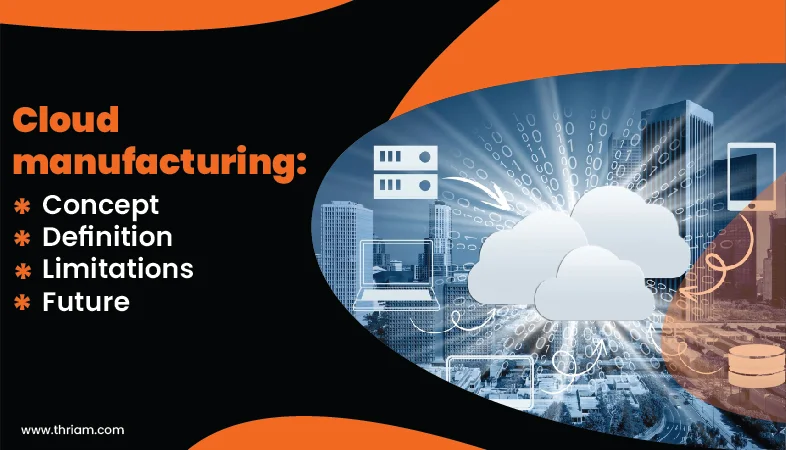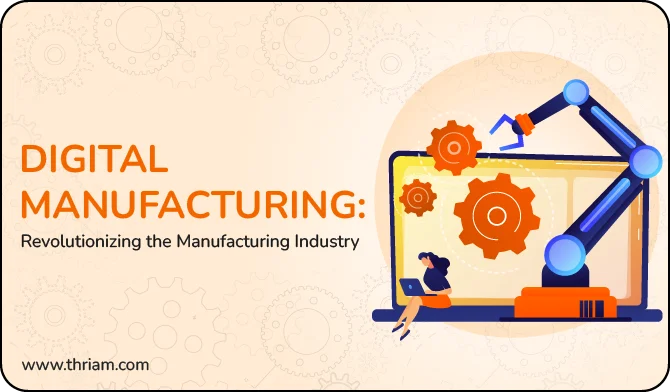Breaking Barriers, Unleashing Possibilities: The World of Cloud Manufacturing

In the era of digitization and advanced technologies, cloud computing has become an increasingly popular and transformative approach to various industries. Cloud computing has applications in numerous sectors, and one such emerging concept is cloud manufacturing. In this blog, we will delve into the world of cloud manufacturing, discussing its definition, significance, applications, and limitations.
Defining Cloud Manufacturing
Cloud manufacturing, also known as Manufacturing as a Service (MaaS), can be defined as a web-based infrastructure that enables users to share and access manufacturing resources and capabilities over the cloud. It essentially leverages the principles of cloud computing to provide on-demand access to manufacturing services, resources, and information.
Origin of Cloud Manufacturing: Transforming the Manufacturing Landscape
The origins of cloud manufacturing can be traced back to the convergence of two significant trends: cloud computing and manufacturing technologies. Cloud computing, with its ability to deliver computing resources, storage, and software over the internet, gained prominence in the early 2000s. Simultaneously, advancements in manufacturing technologies, such as 3D printing and automation, were reshaping traditional manufacturing processes.
The concept of cloud manufacturing gradually began to take shape as industry experts recognized the potential benefits of combining cloud computing and manufacturing capabilities. The convergence of these two domains presented an opportunity to transform the manufacturing landscape by providing on-demand access to resources, scalability, and collaboration.
Factors Driving the Adoption of Cloud Manufacturing

Cost Savings and Resource Optimization:
Traditional manufacturing involved significant upfront investments in infrastructure, machinery, and inventory. Cloud manufacturing offered an attractive alternative, allowing businesses to eliminate or minimize capital expenditure. By leveraging cloud-based manufacturing resources and services, companies can access cutting-edge technologies without investing in expensive equipment. This results in reduced production costs and improved resource optimization.
Flexibility and Scalability:
The dynamic nature of business demands greater flexibility in manufacturing operations. Cloud manufacturing offers the ability to scale production up or down quickly, based on changing market demands or business requirements. This flexibility enables manufacturers to stay agile, adapt to market trends, and meet customer expectations without disruptions.
Collaboration and Global Reach:
Cloud manufacturing facilitates collaboration and information exchange among geographically dispersed teams. Manufacturers can seamlessly work with suppliers, partners, and customers located anywhere in the world. This global connectivity enhances innovation, accelerates product development cycles, and enables businesses to tap into diverse talent pools and markets.
Advanced Technologies and Analytics:
Cloud manufacturing leverages advanced analytics, artificial intelligence, and big data to optimize manufacturing processes. Real-time data collection and analysis enable predictive maintenance, efficient inventory management, and quality control. By harnessing these technologies, manufacturers can enhance productivity, improve product quality, and reduce downtime.
Applications of Cloud Manufacturing
Rapid Prototyping and Design: Cloud manufacturing enables designers and engineers to quickly create, simulate, and iterate prototypes remotely, leveraging powerful cloud-based design tools and 3D printing technologies.
Supply Chain Management:
The cloud-based infrastructure of cloud manufacturing facilitates efficient supply chain management by enabling real-time visibility, tracking, and coordination of resources, suppliers, and logistics.
Manufacturing Resource Planning:
Cloud manufacturing software solutions provide manufacturers with comprehensive planning capabilities that integrate inventory management, production scheduling, and resource allocation, leading to improved production planning and cost optimization.
Customization and Personalization:
In an era of increasing customer demands, cloud manufacturing allows for mass customization and personalization of products. Manufacturers can easily adapt their production processes to meet individual customer requirements, providing a competitive edge in the market.
Limitations and Challenges of Cloud Manufacturing

Security and Privacy Concerns:
Adoption of cloud manufacturing raises security concerns related to the protection of intellectual property, proprietary data, and potential data breaches. Robust cybersecurity measures and data encryption protocols must be implemented to mitigate these risks.
Reliability and Network Connectivity:
Cloud manufacturing heavily relies on a stable internet connection. Any disruptions in network connectivity can halt or delay manufacturing processes, negatively impacting operations.
Lack of Standardization:
The absence of universally accepted standards and protocols in cloud manufacturing can lead to compatibility issues between different software systems and equipment. Efforts are being made to establish standardization frameworks within the industry.
Dependency on Service Providers:
Manufacturers relying on cloud manufacturing depend on the service provider's reliability and availability. Ensuring quality services and uninterrupted customer support becomes crucial to minimize risks.
The Future of Cloud Manufacturing
The adoption of cloud manufacturing is poised to grow exponentially as organizations increasingly recognize its transformative potential. As technology continues to advance, the concept will likely expand to encompass other areas such as robotics, internet of things (IoT), and augmented reality (AR).
The future of cloud manufacturing will rely on addressing challenges related to cybersecurity, standardization, and network connectivity. Efforts are underway to establish industry-wide standards and best practices to ensure interoperability and data security.
Conclusion
Cloud manufacturing represents an innovative approach to manufacturing, enabling companies to leverage the power of the cloud to improve operational efficiency, reduce costs, and unlock new opportunities. While there are some limitations and challenges, ongoing advancements and industry collaborations continue to pave the way for a more secure and standardized cloud manufacturing ecosystem. As technology evolves, cloud manufacturing is expected to play a pivotal role in shaping the future of manufacturing and supply chain management.



